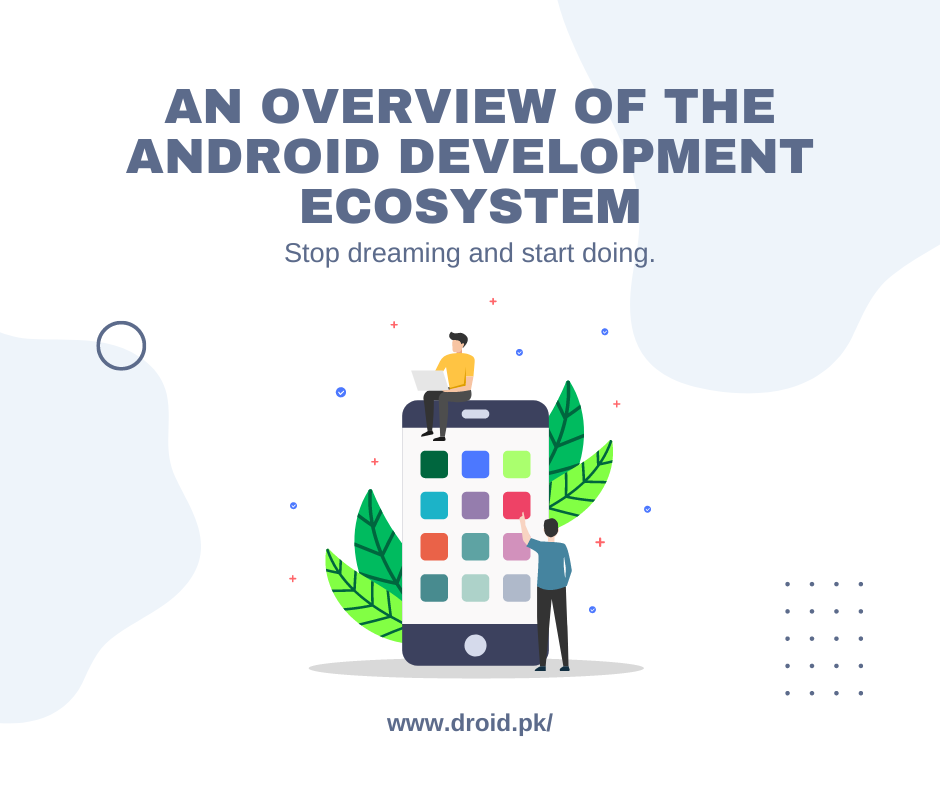
An Overview of the Android Development Ecosystem
Share

| Heading | Subheading(s) |
|---|---|
| Introduction | |
| What is Android? | |
| The Importance of Android Development | |
| Key Components of the Android Development Ecosystem | Tools and Technologies, Programming Languages, IDEs, Documentation and Resources |
| Android App Development Process | Ideation, Design, Development, Testing, Deployment, and Maintenance |
| Popular Android Frameworks and Libraries | |
| Google Play Store | |
| Monetization Strategies for Android Apps | In-App Purchases, Advertising, Subscriptions, Paid Apps |
| Security and Privacy Considerations | |
| Future Trends in Android Development | |
| Conclusion | |
| FAQs |
In today's digital age, mobile applications have become an integral part of our lives, offering convenience, entertainment, and productivity on the go. Among the various mobile platforms, Android stands out as a dominant player with its widespread popularity and vast user base. This article provides an overview of the Android development ecosystem, exploring the tools, technologies, and processes involved in creating Android applications.
What is Android?
Android is an open-source operating system designed specifically for mobile devices. Developed by Google, it provides a robust and flexible platform for app development, allowing developers to create innovative and feature-rich applications that can run on a wide range of devices.
The Importance of Android Development
The demand for Android applications has been skyrocketing, driven by the growing number of Android users worldwide. Businesses and individuals alike recognize the importance of reaching this large audience and offering tailored experiences through Android apps. Android development presents exciting opportunities for developers to showcase their creativity and contribute to the ever-expanding app ecosystem.
Key Components of the Android Development Ecosystem
Tools and Technologies
The Android development ecosystem offers a wide range of tools and technologies to streamline the app development process. Android Studio, the official integrated development environment (IDE), provides a comprehensive set of tools for designing, coding, debugging, and testing Android applications. Other popular tools include Gradle, a build automation tool, and Firebase, a platform for app development and backend services.
Programming Languages
Developers have the flexibility to choose from multiple programming languages for Android app development. Java has been the traditional language for Android, offering a mature ecosystem and extensive libraries. However, Kotlin, a modern programming language fully supported by Google, has gained significant traction due to its concise syntax, null safety, and interoperability with Java.
IDEs (Integrated Development Environments)
IDEs play a crucial role in Android development, providing developers with a unified environment for coding, testing, and debugging. Android Studio, as mentioned earlier, is the recommended IDE for Android development. Its powerful features, such as code completion, visual layout editor, and built-in emulator, enhance developer productivity and efficiency.
Documentation and Resources
The Android development ecosystem offers comprehensive documentation and resources to guide developers at every step. The official Android Developer documentation provides detailed explanations, tutorials, code samples, and best practices. Additionally, developer communities, online forums, and blogs contribute to the wealth of knowledge and support available to Android developers.
Android App Development Process
The Android app development process involves several stages, each crucial for creating a successful application. Here's an overview of the typical app development process:
-
Ideation: The initial stage where developers brainstorm ideas, define the app's purpose, target audience, and desired features.
-
Design: In this phase, developers create wireframes, design the user interface (UI), and establish the visual aesthetics of the app.
-
Development: The actual coding and implementation of the app's functionality take place in this phase. Developers utilize the chosen programming language, frameworks, and libraries to bring the app to life.
-
Testing: Rigorous testing is essential to ensure the app functions as intended and delivers a seamless user experience. Various testing techniques, such as unit testing, integration testing, and user acceptance testing, help identify and resolve any issues or bugs.
-
Deployment: Once the app passes the testing phase, it is ready for deployment. Developers submit the app to the Google Play Store or other distribution platforms, ensuring compliance with the respective guidelines and policies.
-
Maintenance: App maintenance involves monitoring, bug fixes, performance optimizations, and updates to keep the app up to date, secure, and compatible with new Android versions.
Popular Android Frameworks and Libraries
To expedite development and leverage pre-built functionalities, developers often rely on popular Android frameworks and libraries. Some widely used frameworks include:
- Flutter: A cross-platform UI toolkit by Google, enabling the development of high-performance apps for Android and iOS.
- React Native: A JavaScript framework for building native-like mobile apps using React and JavaScript.
- Android Jetpack: A set of libraries, tools, and architectural guidance provided by Google to accelerate Android development.
- RxJava: A reactive programming library that simplifies asynchronous programming and event-based communication.
These frameworks and libraries offer ready-to-use components, enhance developer productivity, and provide solutions for common app development challenges.
Google Play Store
The Google Play Store serves as the primary distribution platform for Android applications. It provides developers with a global audience and extensive reach. The Play Store offers various features, such as app listings, ratings and reviews, app monetization options, and analytics to track app performance.
Monetization Strategies for Android Apps
Developers have multiple monetization strategies to generate revenue from their Android applications:
-
In-App Purchases: Offering additional features, virtual goods, or content upgrades within the app.
-
Advertising: Integrating ads within the app through ad networks, such as Google AdMob, to earn revenue based on impressions or clicks.
-
Subscriptions: Providing subscription-based access to premium content or services within the app.
-
Paid Apps: Requiring users to purchase the app upfront to access its full functionality.
Security and Privacy Considerations
As Android apps handle sensitive user data, ensuring security and privacy is of utmost importance. Android provides robust security features, such as app sandboxing, permission-based access controls, and encryption. Developers must follow security best practices, adhere to secure coding guidelines, and regularly update their apps to address potential vulnerabilities.
Future Trends in Android Development
The Android development landscape continues to evolve rapidly, driven by emerging technologies and user demands. Some notable trends shaping the future of Android development include:
-
Foldable Devices: Android is adapting to the rise of foldable smartphones and tablets, enabling developers to create innovative multi-screen experiences.
-
Artificial Intelligence (AI) and Machine Learning (ML): Integration of AI and ML capabilities into Android apps for enhanced personalization, predictive analytics, and intelligent automation.
-
Internet of Things (IoT) Integration: Android devices serving as control hubs for IoT devices, allowing users to manage their smart homes, wearables, and connected appliances.
-
Instant Apps: Streamlined app experiences without the need for full installations, providing users with instant access to specific app functionalities.
Conclusion
The Android development ecosystem offers a vast array of tools, technologies, and resources for creating powerful and engaging mobile applications. Developers can leverage the flexibility of programming languages, frameworks, and libraries to bring their app ideas to life. With the extensive reach of the Google Play Store and various monetization options, Android app development presents exciting opportunities for both developers and businesses.
As the Android platform evolves, developers must stay up to date with the latest trends and best practices to deliver exceptional user experiences. By embracing the Android development ecosystem, developers can create innovative and impactful applications that cater to the needs and desires of Android users worldwide.
FAQs
Q: Can I develop Android apps using languages other than Java? A: Yes, you can develop Android apps using Kotlin, a modern programming language fully supported by Google. Kotlin offers concise syntax, enhanced null safety, and seamless interoperability with Java.
Q: How can I publish my Android app on the Google Play Store? A: To publish your app on the Google Play Store, you need to create a developer account, follow the publishing guidelines, prepare necessary assets, and submit your app for review. Once approved, it will be available for download on the Play Store.
Q: Are there any restrictions on app monetization strategies on the Google Play Store? A: While the Google Play Store allows various monetization strategies, it has guidelines and policies that developers must follow. Ensure compliance with the policies and provide value to users to maintain a positive app experience.
Q: What are the key considerations for app security on Android? A: App security on Android involves practices like secure coding, encryption of sensitive data, proper use of permissions, and regular updates to address potential vulnerabilities. Following security best practices and staying informed about security updates is crucial.
Q: How can I keep up with the latest trends and updates in Android development? A: To stay updated with the latest trends and updates in Android development, follow official Android developer resources, participate in developer communities and forums, attend conferences and webinars, and explore online tutorials and blogs dedicated to Android development.
